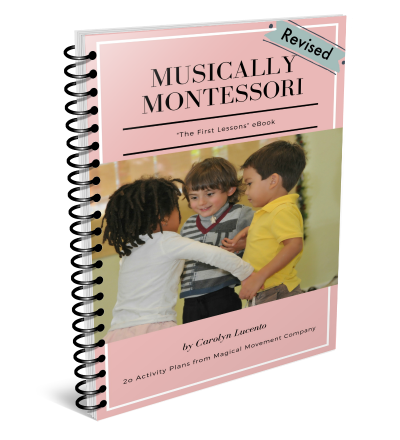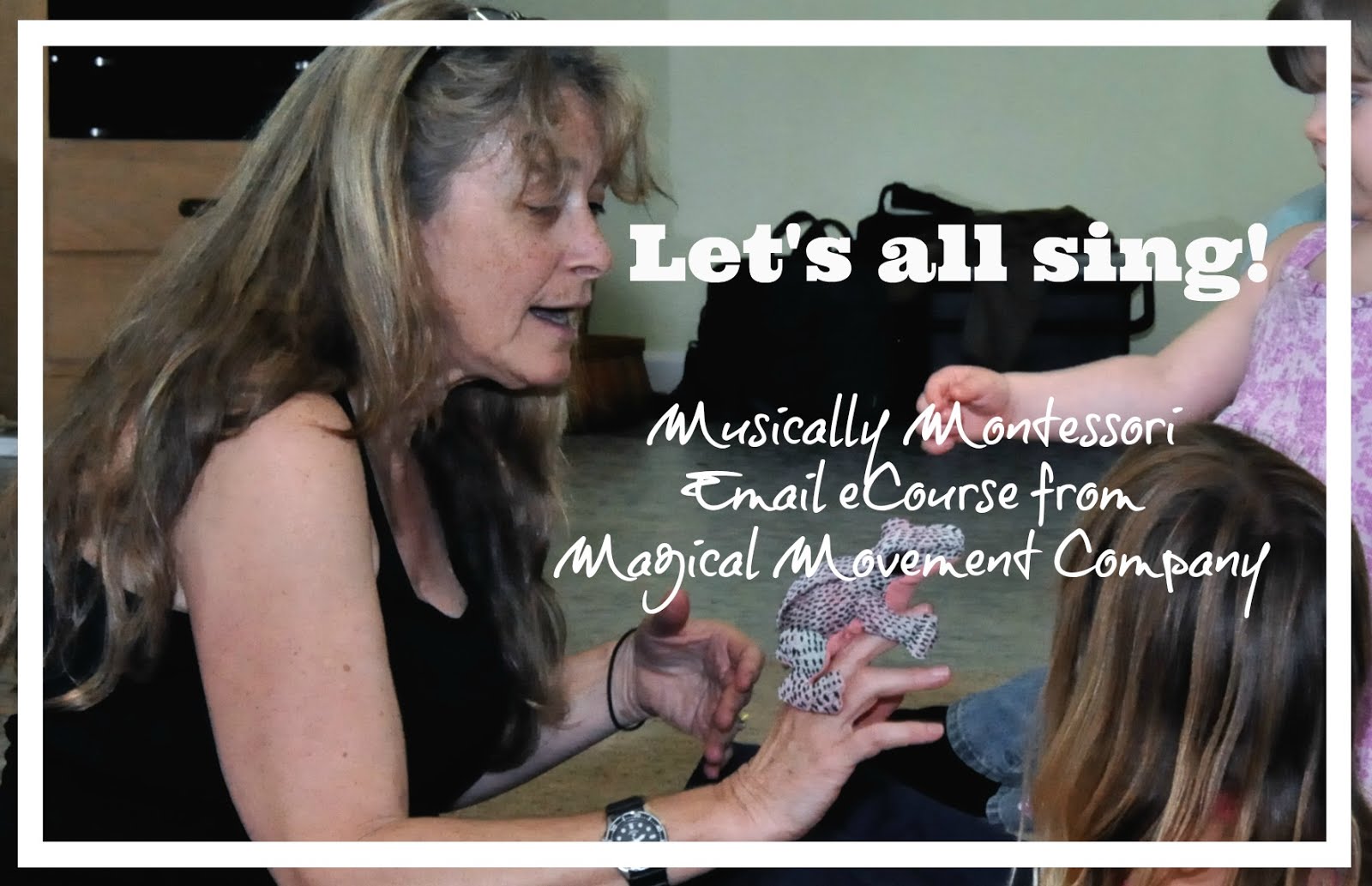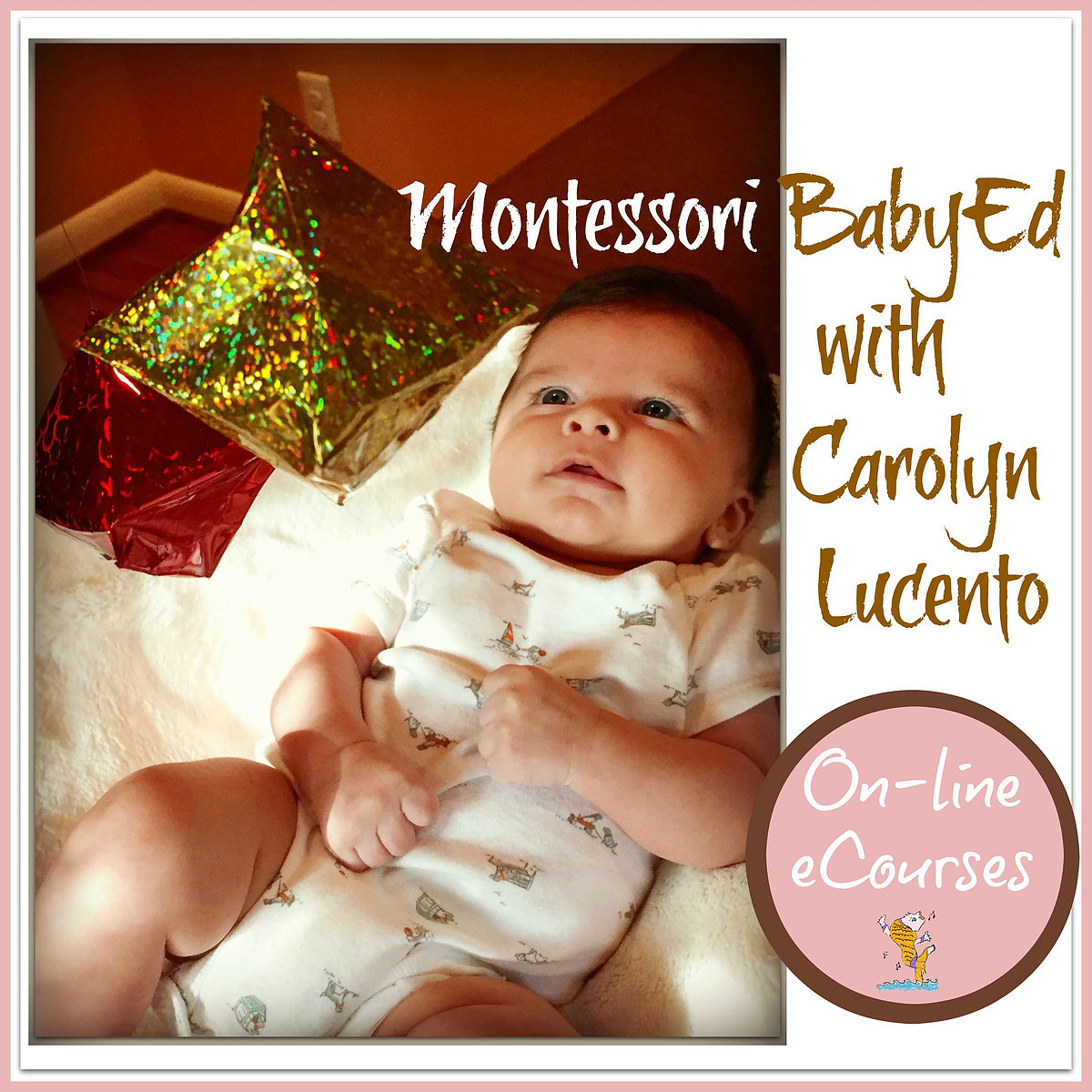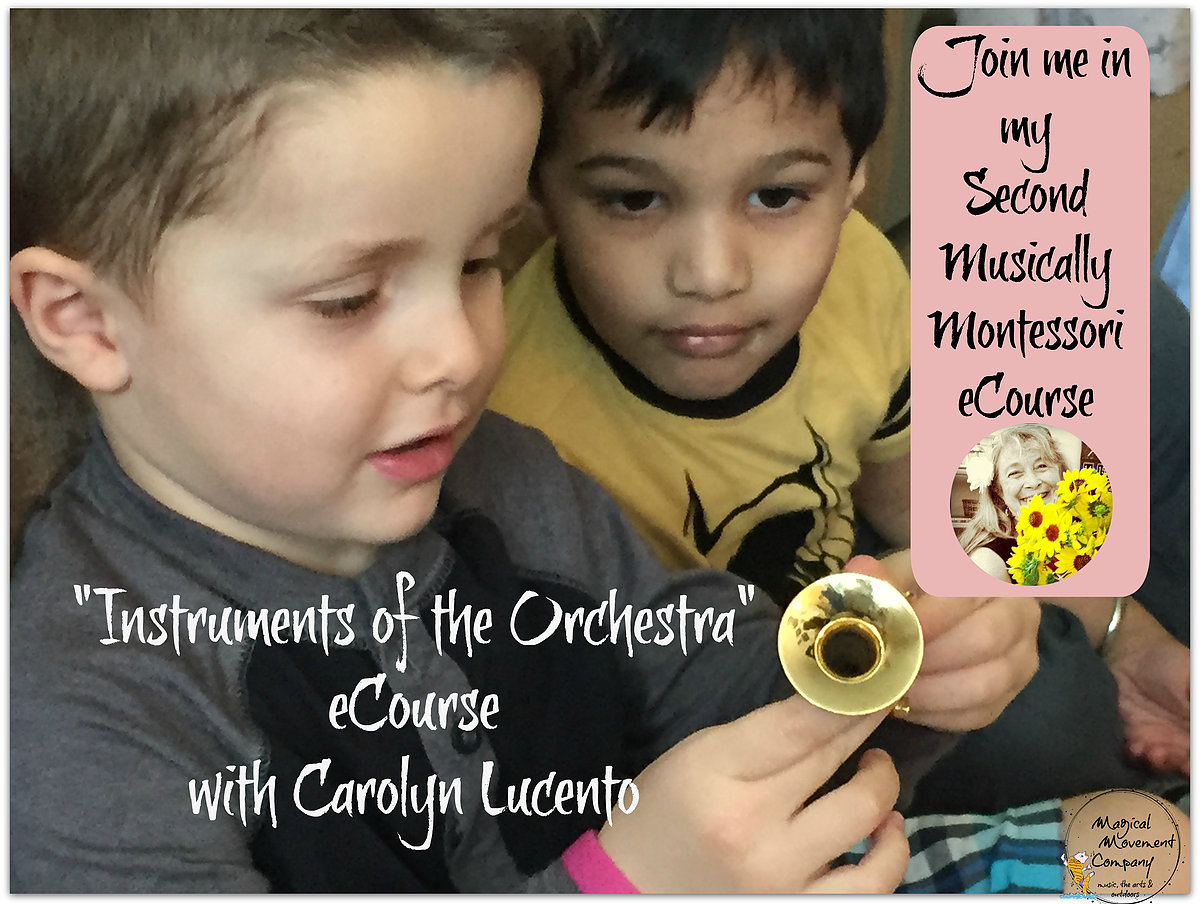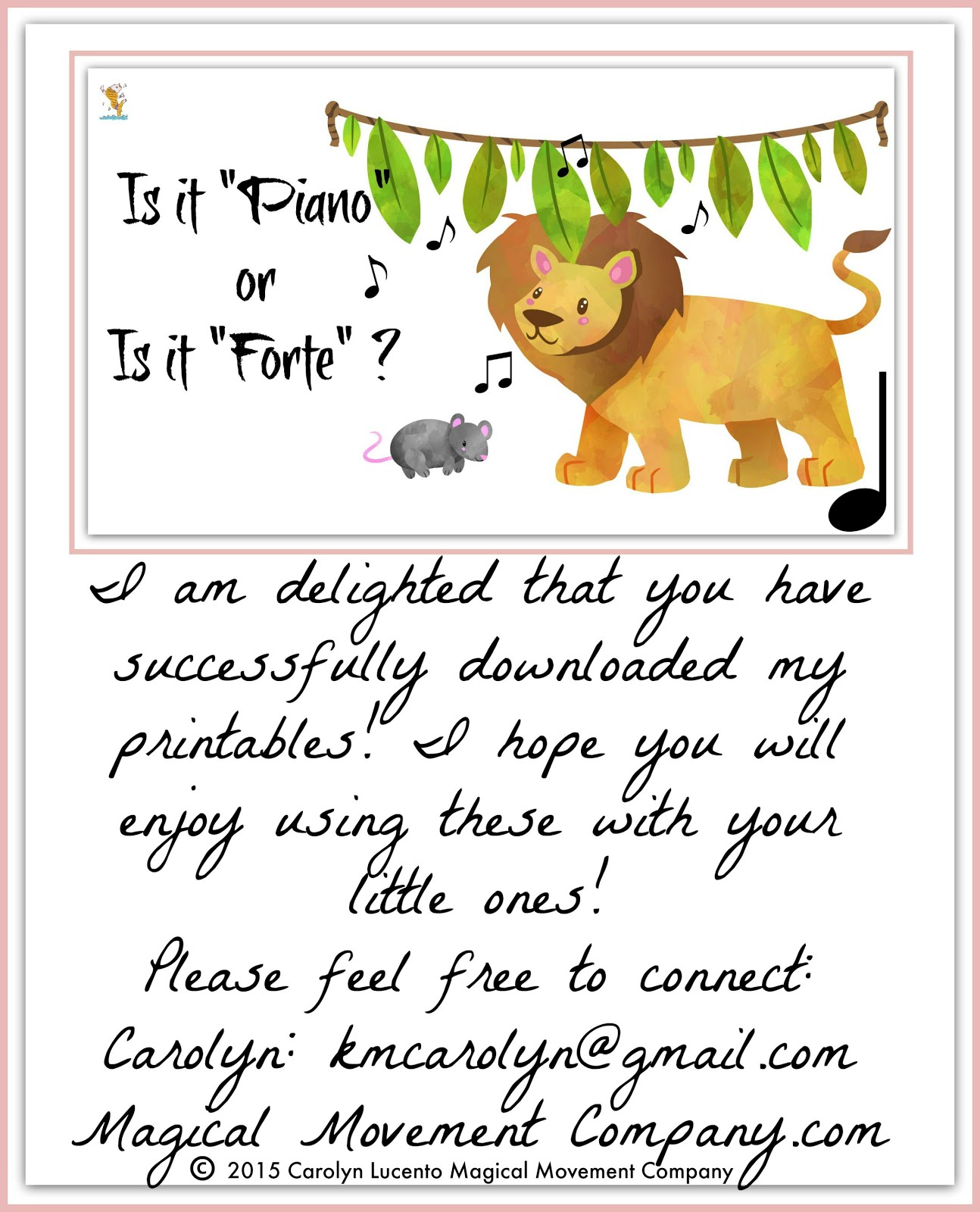TEACHING MUSIC TO PRESCHOOLERS IN A CLASSROOM SETTING IS BECOMING A VIABLE WAY TO MAKE A LIVING...AND WHAT FUN!
As a result of all the many studies pointing to the cognitive benefits of early music learning, many Preschools now feature a music class each week. The children have a thirty minute time slot where they make music together right in the classroom, with the music specialist and the classroom teachers.
Over the past 3 1/2 years, I have developed a very nice business offering preschool music classes, and nowadays I am actually turning away business because I don't have time in my schedule for any more classes!
I am always on the look-out for Montessori teachers in my area who really enjoy singing, dancing and exploring music with their groups because I would love to introduce them to the preschools that I have had to say "No" to!
My standard "pitch" to my AMS students is: "I'm willing to train you!"
BECOME A PRESCHOOL MUSIC SPECIALIST!
Watch for my upcoming eCourses later this summer/fall. I'll be focusing on:
- a music curriculum for the preschool classroom teacher
- and also offering training to teachers who want to become music specialists
- My courses will be based on my expertise with the Montessori method of teaching and my Orff-Schulwerk background. That makes them even more fun and more successful for you!
My email subscribers will always be the first to know about my upcoming training/ eCourses and my new music products. If you haven't joined my list, it's easy. Sign up on the sidebar of this blog! You'll receive my free eBook, too!
Subscribe to our email list
Many people, I think, are intimidated when it comes to music instruction. They think it requires "talent" and a Bachelor's degree in music.
Well, it certainly helps if you play or sing, and if you have studied music, then you have a great foundation. However, with young children in a group setting, the FIRST REQUIREMENT for a successful music class is that the teacher has CLASSROOM MANAGEMENT SKILLS.
Music classes in a preschool setting invariably mean that the whole group of children will be invited to the music circle. This makes the management skills of the teacher the crucial factor in the success of the experience for all.
THE GOOD NEWS IS that group management skills can be learned, developed and refined!
THE EVEN BETTER NEWS IS that music, in itself, is a very effective aid to group management!
So, if you already work with young children and you already love music, then why not consider becoming a Preschool Music Specialist?
ROUTINES and PROCEDURES
The way to effective group management lies first in the predictable routine and the consistent procedures the teacher has created.
Before entering your first music class, explore your own rationale for teaching music in the Preschool classroom and then describe the goals you will have for the children. What skills do you want to help them develop and what concepts do you want them to have experience with? These will help you with setting your music-related goals for the children and likewise, this will be a big aid in writing up any materials for marketing your music class business.
Then, decide on the general routine of the class. My classes basically follow this routine:
- Opening warm-ups
- Singing hello
- Echo rhythms
- Movement activity
- Focused listening
- Demo of the music concept of the lesson
- Instrument exploration
- Ending activities (singing goodbye and getting a music stamp on the hand)
Next, decide HOW you will PROCEED with things like:
- Movement activities (How will you keep it safe, yet fun? ex: Will children need to do the movement activities while still staying in place at the circle as opposed to freely moving in the room?...this needs to be demonstrated to the children and then followed fairly consistently)
- Giving out and taking up instruments (I do this quickly with the teacher helping and I request that the children rest their instruments until everyone has theirs)
- Taking turns (When you introduce a special instrument or prop, will you have a system? Ex: oldest to youngest or starting with the very quietest group...)
- Dismissing/ ending (Will children leave music circle one by one or stay seated for the next activity?)
- Children misusing props or instruments (First, I show children a variety of ways to safely play an instrument and then, I show them any ways that are unsafe and not allowed. Later, if a child is being unsafe with the instruments, like poking a rhythm stick at their neighbor, then I calmly take the instruments away from the child and then s/he can just "pretend to play." I usually say, "I'll bring this back when you are ready.")
- Child disturbing others with obnoxious sounds ( I politely remind children to use their most beautiful singing voices, and that "silly singing" is for outside play)
SINGING
Our first musical instrument is the voice, and this means that the music specialist will be doing a lot of singing with the children. You don't have to know a gazillion songs, but you do have to have a pleasant singing voice and be able to sing in tune.
If you feel fairly confident with your singing ability, then your first skill is in place already!
If you feel fairly confident with your singing ability, then your first skill is in place already!
You can certainly continue to develop your singing skills, too. I am constantly working on improving my own breathing techniques, intonation, and vocal stability as a singer and I have found so many resources for this. Here's my favorite: Susan Anders Vocal Coach On-line Resources
The successful music specialist will SING what s/he wants the children to do. (an effective group management skill)
I just make up the songs that I use for:
- sitting ready (straight back, bottom on the floor, or feet on the floor if children happen to be sitting in chairs)
- resting instruments before everybody plays
- waiting patiently when turn-taking is happening
- gently putting instruments away
- giving children the cue to start singing or playing (ex: sing: "Ready, Set, Sing...")
- regaining their attention, by singing about the children who are sitting attentively
A fundamental part of singing as a model for young children is warming up the voice. When I am driving to my next school to teach music, I warm up my voice (and learn or practice songs) right in the car with recordings on my car stereo. I often put on some of my favorite songs (like Ray Charles or Dolly Parton) and sing along at the top of my lungs! I definitely practice a new children's song or my current music class playlist while driving in my car, so that the drive feels really productive.
Likewise, one of the favorites with my groups is our playful warm-ups that we do at the beginning of each class. We not only warm up our voices, we also warm up the muscles of the hands, arms, and face to prepare ourselves for making music. You can read more about this at my post: Musically Montessori #6, Warming Up For Music Class.
ECHO RHYTHMS
Young children will sing more readily when given simple songs and rhythm patterns that they echo after you. After warming up, an introductory hello song in which the children copy what you sing is a great way to get the music lesson off to a good start.
Here is a link to an echo hello song from Lynn Kleiner: Lynn Kleiner on Amazon.
Here is a link to an echo hello song from Lynn Kleiner: Lynn Kleiner on Amazon.
An important part of music is keeping the beat. Everyone can benefit from practice with this! Even professional musicians sometimes use metronomes to help keep the beat when learning a new song.
Music class for young children should always include some practice with rhythm patterns. These can be done with the voice, or with clapping the hands, or even with stamping feet, patting knees, flicking/ snapping the fingers, and clicking the tongue.
Frank Leto is my favorite resource for echo rhythms and songs. If you ever get a chance to attend one of his workshops at a Montessori conference...get to it early as his workshops fill up quickly! Here is his website that is chock full of resources and luckily, all of Frank's music and dvd s are on Amazon, too.
MOVEMENT
Children will be moving spontaneously throughout music class, but I also like to include a "Movement Activity" in each lesson. This means the children will get up and move.
I use a variety of resources for movement activities, but I generally rely on a recording so that I can move along with the children and not have to worry about directing them with my voice.
There are wonderful resources for Movement with children.
Here are just a couple of my favorites:
Sanford Jones, Movement and Singing Games
Greg and Steve, Kids in Motion
Sanford Jones, Movement and Singing Games
Greg and Steve, Kids in Motion
Movement activities can be enhanced by using music props, like scarves, rainbow ribbons, miniature flags, or taped lines on the floor. Keep it simple, though! I mostly don't use props, but they are fun as an occasional surprise.
Want to learn more? Watch for my upcoming blog post:
Musically Montessori: Becoming a Preschool Music Teacher, Part Two!
That post will cover these topics:
- Focused listening
- Introducing the basic concepts of music
- Exploring rhythm instruments
- ...and more!
THERE'S A SUPER SPECIAL MONTESSORI EVENT
IN THE WINGS
FOR JULY!
STAY TUNED....
Thank you again, for visiting my Blog today. I hope you got some inspiration and useful information.
Please hop over to my Facebook page and let me know your thoughts on learning some of my secret strategies for teaching music that I plan to divulge in my upcoming eCourse!
I just linked up this article with others at the "Montessori Monday Link-up" at Living Montessori Now. Such a fabulous resource to check out every Monday! Deb Chitwood has included another adorable video of her 2 1/2 yr old grand daughter working with magnet letters and initial sounds. Here's the link: Montessori Monday.
Advertising Disclosure: Magical Movement Company may be compensated in exchange for featured placement of certain sponsored products and services, or your clicking on links posted on this website. Thanks for your support!







